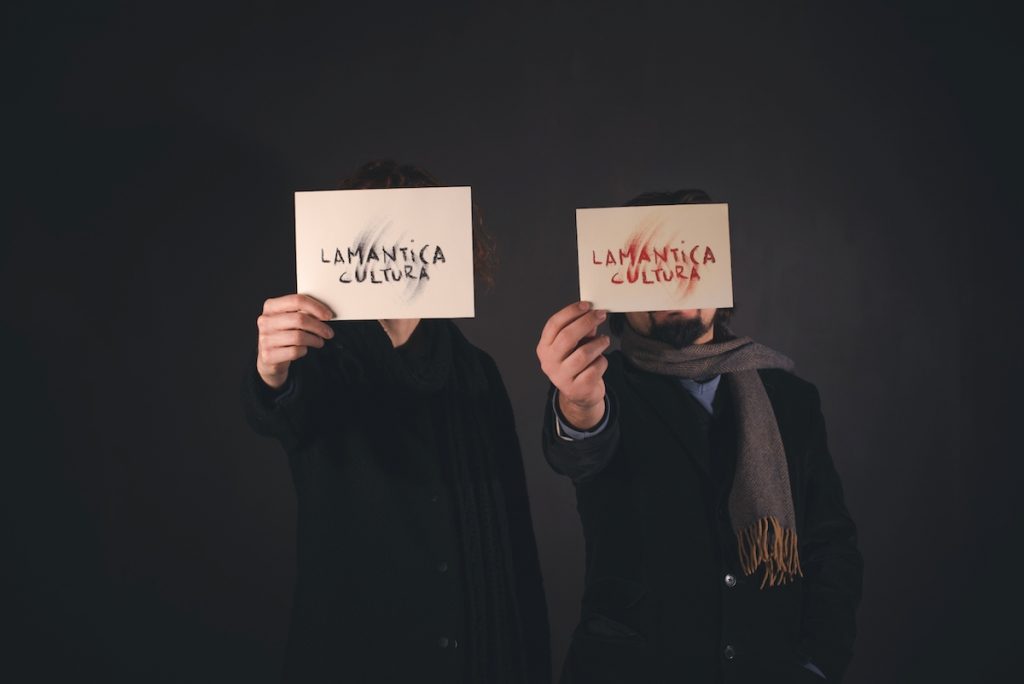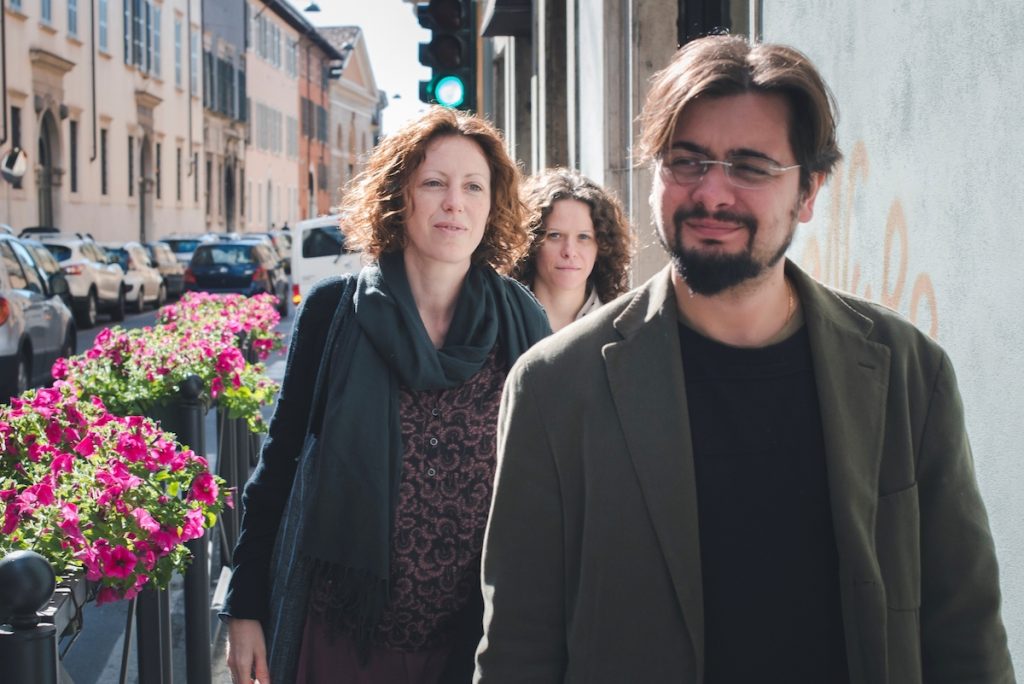Lamantica is freshly born but can be listened to with a great pleasure.
A miniature-publisher printing only books made with azure paper, it started with the less popular genre in Italy (poetry) and it now expands to theatre and beyond, with a very precise and peculiar editorial touch.
Which was the idea behind this, Giovanni Peli, Federica Cremaschi? And how is going there in Brescia?
F: Our first literary conversations happened in the half lights of the city theatre in which Giovanni and I met when we’re stewarding after graduation – he a poet, sing-song writer and librarian; me a translator and a very free-lance props woman. So, poetry and theatre have been our first shared bits, long before we’re becoming life and work partners. Brescia, as a not native here, is still fascinating me as an unexplored territory but, beside the appearance of the renewed art&culture city, is still very provincial and has a very ‘patronage’ aptitude. It is not the place you would call exciting, it is difficult to create networks and collaborations for affinities, but sometimes you know that initial hurdles and shoutouts are stimuli to create and to attempt to something different. It has been a Giovanni’s idea to fuse our passions and skills to create a miniature publisher which would explore those niche ‘edges’ that often pose – or, this is what they want to let you believe to – commercial and marketing difficulties in selling such a different ‘printed product’.
G: I would only add that poetry is not at all the less popular genre nowadays: there is (I believe that it has been always in this way) a massive poetic production in Italy and there is also an overwhelming quantity of published poems. It is somehow difficult to get an orientation among publishers and webzines, I hope that beside this overflowing production also the critics will be more refined and will quit certain prejudices or stop to be anchored to the will or the approval of some publishers and will also stop the continuous and immovable celebration/self celebration of the usual authors.
I am sure there is lots of crap in that enormous pot of poetry but I am also sure that the crap is also in the so-called ‘high-level’ people. There are a good bunch of people defining themselves the ‘poetry’ champions ready to say what is poetry and what is not. The assumption is mostly badly placed and therefore create such a sterile debates and ‘parties’ rather than convincing aesthetic reflections. I believe that a poet is often well considered for very extra-poetic issues, for instance the notoriety, the critical ability, the editorial power or similar. Sometimes when I read – indeed very much and very often – very famous authors, I do not get touched by them at all. So, as you can see, it is very complicated either to write and to publish and widespread poetry today but for sure the circuit is well alive. There are also a lot of poetry festivals…
You have different backgrounds and you’re a magic number, 3. Where do you come from and which is the secret to be still a good bunch of companions?
F: The third Lamantica ‘soul’ is the member of our charity company (associazione culturale), she is a friend and an artist and will come along with us on the possible and future outputs in the art activities with social purposes while the publishing venture is for the moment lead by our four hands.
G: The secret is to have common values and there is also, I guess, a good dosage of temerity and braveness to undertake this entrepreneurship without being very rich. Regarding myself and my stubbornness to perseverate, it also derives from the fact I want to proof that you can manage a cultural venture with your sensitivity and your ideas; you will not earn a lot, you will not move huge funds but if you think that these are the ideals behind a cultural venture you’re playing another game, not ours.
Your editorial distribution is very careful given that your books are always in limited edition. Do you also use internet to get purchases or orders? Where do you find you audience and which is their main age? For instance, we got extremely surprised that Slow Words readers who interact with us more on the poetry section are the youngest…
F: We select among the independent bookstores, time by time, those who are closer to our vision of a book and with them we start a collaboration which means to host presentations and have small stocks on consignment. Another careful selection is about the fairs dedicated to small and independent publishers – which are now a lot and sometimes very expensive. I might say that the stories of those discovering us on internet or thanks to the word of mouth are amazing: they often stand for real signs of destiny from which collaborations and fidelity start.
If we come to the age of our fans, we have young super-connected writers and very passioned pre-computer age readers who are both bond by the search of a book breaking the template.
Can you tell us the ideal volunteer for your venture in case you are looking for fresh hands and brains to catch your next dreams?
F: At the moment we are either the volunteers and the patrons of our charity; in this phase we are barely able to ask for a support to our friends and relatives: to be hosted, to be paired, to be fed! When we are exhibiting in a fair; another critical review of a manuscript or another comment on the drafts to be printed; a very quick photo shooting for a new printed book or for a book presentation.
G: I like to just add a very prosy ingredient: the selling strategies are necessary and never enough, so it could be very worth to have more ideas on this issue – even in a situation as ours which is non-profit, even if the goal is another.
This said, our ideal collaborator should be very passioned about literature, with a true and visceral drive bringing him to have a very strong humanistic literacy or a literary one. I should say that we would love to have a nostalgic passioned of the XXth century literature who, thanks to this gift, has the skill to catch that exact feu sacre in the contemporary writers. We’ve forgotten it because the blockbuster bestsellers – the literature we do not like, published by the majors and served by their editors to the clients-readers— do not bear the stylistic preciousness in their priority.
Which are the next titles to become books in the near future?
F: We are designing a double ‘return’ to poetry for the years 2018-2019: a collection of a young and prolific poet and an experimental ouvre of a writer and researcher; the second chapter of a self-myth-biographic pentalogy (as the author defines it) started with ‘Fantasmata’ by Massimo Morasso; the translations of some unpublished writings of which we are at the present time negotiating the rights (they span from narrative to theatre).
G: I would love to bring among the little Lamantica azure pages also a good example of pure narrative, let’s see.
What do you think to give to Brescia and what do you get back from it
F: We are actually very careful to step into the cultural dynamics of the city and into the more specific publishers’ arena: there has been of course some keen journalist or critic who spotted us and gave us some attention and reviews. There has been some bookstores – less commercial than others – which gave us space. The main city book fair is less receptive and is more a place where to find famous people than books but maybe in the next future we could find a common dialogue and synergy.
G: I am allergic to big events, I think they’re not suitable for us and for our way of thinking. The wait for a big yearly event can be really damaging. A truly lively city has to have many events and proposals every day. Those designing these proposals have to have the space to grow and to continue. The other charities and the various culture companies should have a good rivalry to produce better and more (and this is the sole ‘rivalry’ I am personally interested in): a sane competition originating new challenges and works nurturing us either culturally and spiritually.
Today ‘figures’ are the main issue and the most important asset to design culture and therefore everything is cannibalized by larger and bigger events. It would be fantastic that instead of ten people attending a book presentation there would be 50, a very little bunch taken from those huge figures crowding the big events inundating the cities with their food trucks and whatever – leaving a very small print or echo of the festival topics (poetry, philosophy, music, and so on).
I see that city councillors of such a rich city as Brescia – rich of various assets – have only one way to design culture – the big events – since a few years here. I, will hope (as I always did with my poetic and musical activity) to continue to design my events which are standing for an authentic creative reflection – pleasant or challenging, maybe causing reflections.
Where do you see Lamantica within the next 10 years?
F: It would be nice to imagine Lamantica as our main business activity with a good cash flow without abandoning our original and recognizable touch.
G: I don’t deny that I would love Lamantica came up beside by other publishers as well as brave in the choices plus engaged in keeping the quality of their catalogue high. Even by continuing with limited edition prints. I hope also the same for me as an author, I hope I will be able to continue, even if in the outskirts, to work with authenticity toward a small perfect world. I would titillate that dream without recurring to very prosaic phrases as ‘fuck them up’, ‘to take the world by storm’ and similar…
What did you learn until now on life thanks to this cultural experience as small entrepreneurs?
F: That around books and among their three acting figures – readers, writers, publishers – uncanny and resistant communities are arising. They live and pin different options of either individual and relational experience.
G: When you do start learning who you are and what you can do to contribute to the beauty, you are not entitled anymore to loose time: you have to cut the dry branches, aka the people wanting to use your talent without letting you grow and getting fulfilled. I learned that the best ingredients are humility and passion even more than intelligence and talent which are only a path to success without the firs two. I learned which is the value of purity, how to distinguish literature born to please the author and the audience, the literature for careerists, for those loving to play with power, and the literature I love which is visceral, authentic and deep. I do not want you to think I talk as a moralist: I love art which suffices to itself because it is all around the human discourse, neither decorative nor to be used as a business card.
http://www.lamantica.it/casa-editrice/ (only in Italian)
Pictures in this interview are by Fabiana Zanola and this story has been brought to us from a friend, Stefano Montani who works in IT and is an amateur theatre actor.

